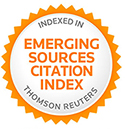Impacto del crédito en la producción del sector agrícola en Venezuela, 1970-1999.
Resumen
El objetivo de este trabajo fue determinar el impacto del crédito en la producción agrícola venezolana durante
el período 970-999. Se realizó una investigación documental descriptiva y explicativa en dos fases: uso de fuentes
secundarias para obtener datos cualitativos y cuantitativos y aplicación de estadística económica y econometría a los
datos cuantitativos. Las cifras se actualizaron a bolívares de 984. En el período ocurrieron cambios en las políticas
públicas de fnanciamiento agrícola en el marco del modelo de capitalismo rentístico (1970-1980) y de los ajustes
macroeconómicos (1983-1999). Las instituciones públicas para el fnanciamiento agrícola fueron: Banco Agrícola y
Pecuario (1970-1974); Instituto de Crédito Agrícola y Pecuario (1975-1999); Fondo de Crédito Agropecuario (1974-
1999) y Banco de Desarrollo Agropecuario (1970-1991). Su desempeño se circunscribió al Paradigma de las Instituciones
Especializadas de Crédito para la Agricultura y en 999 todas habían desaparecido. El crédito agrícola total (CAT)
concedido por las organizaciones públicas fue 93.634 millones de bolívares, con una tasa interanual negativa del 8,54%.
El Valor de la Producción Agrícola (VPAT) mantuvo una tendencia creciente de 3,13%. Entre 1970-980 (capitalismo
rentístico) el CAT creció en 16,75% y el VPAT 4,03%. A partir de 1980 (ajustes macroeconómicos) la tendencia cambió,
el CAT decreció en 19,07% y el VPAT creció 2,48% (tasa interanual). El impacto del crédito en la producción agrícola
resultó débil entre 1970 y 1999.
AbstRact
The impact of credit on the production of Venezuelan agricultural sector during 1970-1999
This main objective of this article is to analyze the impact of public credit on Venezuelan agricultural production,
during the 1970-1999 period. It is a documental and explicatory research, reached in two steps: the frst one, by using
secondary sources for qualitative and quantitative for data searching; the second one, by using statistical analysis and
econometrics for model estimations. Main results revealed that some changes occurred in fnancial public policies
according the rentistic capitalism model (1970-1980) and macroeconomic adjustment programs (983-999), along
the studied period. Agricultural fnancial public institutions were the Agricultural and Cattle Bank (1970-1974), the
Institute for Agricultural and Cattle Credit (1975-1999), the Agricultural Credit Fond (1974-1999) and the Agricultural
Development Bank (1970-1991), despite all of them had been disappeared in 999. Their performances corresponded to
Specialized Agricultural Credit Institutions paradigm (SACI). total Agricultural Credit (CAt) lent by public organizations
along 1970-1999 period was 93,634 millions of bolívares (real values of 1984), showing a decreasing growing rate of
8,54%, while the Aggregate Agricultural Production Value (VPAt) showed an increasing tend, at an annual rate of 3.13%.
Between the 1970-1980 period (rentistic capitalism) the CAt variable grew at 16.75% and VPAt at 4.03%. Since 1980
(macroeconomic adjustments) tends reverted: while CAt decreased at 19.07%, the VPAt grew at 2.48% inter-annual
rate. the impact of public agricultural credit on agricultural production was weak between 1970 and 1999.
Keywords: agricultural credit, economical and fnancial policies, rural fnances, agricultural production, Venezuela
Palabras clave
Texto completo:
PDFP-ISSN 1317-8822 E-ISSN 2477-9547
DOI: https://doi.org/10.53766/VIGEREN
Twitter: @VisionGerenci
Facebook: Visiongeren
Instagram: @visiongerenci
![]()
Todos los documentos publicados en esta revista se distribuyen bajo una
Licencia Creative Commons Atribución -No Comercial- Compartir Igual 4.0 Internacional.
Por lo que el envío, procesamiento y publicación de artículos en la revista es totalmente gratuito.
 |  |  | |
 |  |  |  |
 |  | | |
| | |||
